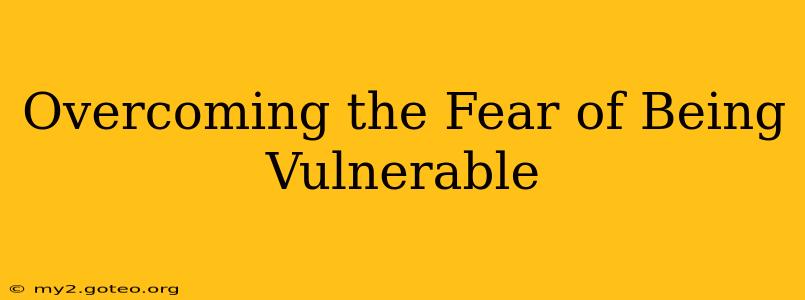Vulnerability. The word itself can evoke feelings of unease, even fear. It conjures images of weakness, exposure, and potential hurt. But what if vulnerability wasn't a weakness, but a superpower? What if embracing vulnerability was the key to unlocking deeper connections, greater authenticity, and a more fulfilling life? This article explores the fear of vulnerability, its roots, and practical strategies to overcome it and embrace the power of openheartedness.
What is Vulnerability?
Before we delve into overcoming the fear, let's define vulnerability. It's not about weakness; it's about courage. It's about showing up authentically, sharing your true self—including your imperfections, fears, and insecurities—with others. It's about being willing to risk being hurt in order to experience the profound rewards of genuine connection.
Why Are We Afraid of Being Vulnerable?
The fear of vulnerability often stems from past experiences. Perhaps you've been hurt in the past by sharing your true self, leading you to build protective walls to shield yourself from future pain. This fear can manifest in various ways, from avoiding intimacy to suppressing your emotions.
What are the consequences of avoiding vulnerability?
Avoiding vulnerability can lead to feelings of isolation, loneliness, and a sense of disconnect from others. It can hinder the development of meaningful relationships and prevent you from experiencing the full richness of life.
How does vulnerability differ from being a "people pleaser"?
Vulnerability is about authentically expressing yourself, even if it means risking disapproval. People-pleasing, on the other hand, is about conforming to others' expectations to avoid conflict or rejection, sacrificing your own needs and desires in the process. It's a form of inauthenticity, the opposite of vulnerability.
Overcoming the Fear: Practical Strategies
Overcoming the fear of vulnerability is a journey, not a destination. It requires consistent effort, self-compassion, and a willingness to step outside your comfort zone. Here are some practical strategies:
1. Identify Your Fears:
Begin by identifying the specific fears that are holding you back. Are you afraid of rejection? Judgment? Betrayal? Once you've identified your fears, you can begin to address them directly.
2. Challenge Your Negative Thoughts:
Often, our fears are fueled by negative self-talk. Challenge these thoughts. Ask yourself: Is this thought really true? What evidence supports it? What evidence contradicts it? Reframing your negative thoughts into more positive and realistic ones can significantly reduce your anxiety.
3. Start Small:
Don't try to become completely vulnerable overnight. Start small. Share a small, seemingly insignificant detail about yourself with someone you trust. As you become more comfortable, gradually share more personal information.
4. Practice Self-Compassion:
Be kind to yourself. Remember that everyone experiences vulnerability. It's a normal part of being human. Treat yourself with the same compassion and understanding that you would offer a friend.
5. Build Trust:
Vulnerability requires trust. Choose people who are supportive, empathetic, and trustworthy to share your vulnerabilities with. Don't rush the process; allow trust to develop organically over time.
6. Cultivate Self-Awareness:
Understanding your emotions and triggers is crucial. Practicing mindfulness and self-reflection can help you become more aware of your emotional state and identify situations that trigger your fear of vulnerability.
7. Seek Support:
If you're struggling to overcome your fear of vulnerability on your own, consider seeking support from a therapist or counselor. They can provide guidance and support as you navigate this challenging process.
The Rewards of Vulnerability
While the path to vulnerability can be challenging, the rewards are immense. Embracing vulnerability allows you to:
- Develop deeper and more meaningful relationships: Authentic connection is built on vulnerability. When you share your true self, you create space for others to do the same, leading to stronger bonds and greater intimacy.
- Increase self-acceptance: By accepting your imperfections, you become more comfortable in your own skin and less dependent on external validation.
- Enhance resilience: Sharing your struggles with others can help you feel less alone and more empowered to overcome challenges.
- Live a more authentic life: When you're not constantly hiding parts of yourself, you can live a more genuine and fulfilling life.
Embracing vulnerability isn't about being weak; it's about being brave enough to show up as your authentic self, flaws and all. It’s a journey toward deeper connection, greater self-acceptance, and a more meaningful life. Start small, be patient with yourself, and remember that the rewards are well worth the risk.

